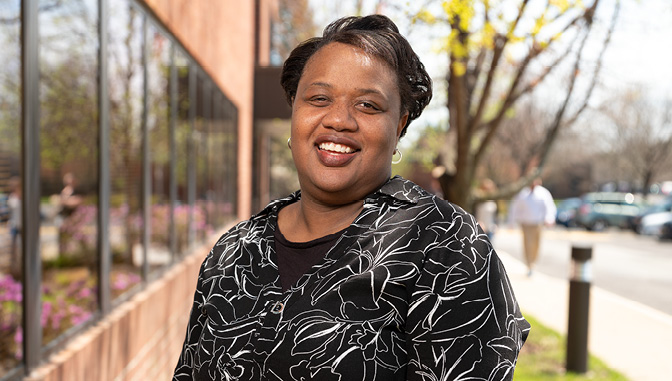Degrees at Work: Christine Robinson-Cooley

Christine Robinson-Cooley remembers looking through her older brother’s criminal justice books when he was in college and liking the information. She says from that point, she was sure she would follow his path into the criminal justice field—which is exactly what she did.
A Storied Career in Criminal Justice
Robinson-Cooley, of Rensselaer, New York, is an assistant re-entry manager with the New York State Department of Corrections and Community Supervision. She started working at the maximum-security Sing Sing Correctional Facility in 1999 as a corrections counselor. Since that time, she has been employed in a variety of roles in the field of criminal justice such as a corrections officer, corrections counselor, alcohol and substance abuse treatment program assistant, facility parole officer, field parole officer in victim services, and senior parole officer. “The environment can be an adjustment because a correctional facility is its own community,” she says, adding that there are many kinds of job opportunities in a facility such as teachers and security staff, as well as administrative and medical roles.
Robinson-Cooley’s days vary between her desk and attending meetings in the community. Her main job is overseeing the discharge planning of the mentally challenged returning to the community after prison. “I assist in addressing barriers to successful re-entry such as housing, treatment, health care, and employment,” she says. She makes sure all the pieces are in place prior to the person’s release.
In addition to working as an assistant re-entry manager, Robinson-Cooley volunteers her time to community mental health programs. She is an active volunteer as a family-to-family education teacher with the New York State National Alliance on Mental Illness (NAMI), a free, 12-session education program for family and friends of those with mental health conditions. NAMI is an evidence-based program taught by trained, experienced family members. Robinson-Cooley is also a crisis intervention volunteer with the Crisis Intervention Team, a collaborative program that creates better connections between law enforcement, mental health providers, hospital emergency services, and individuals with mental illness and their families.
Because she works so closely with people, it is important that Robinson-Cooley has the right skills to succeed in her roles. This includes the ability to communicate well verbally, write effectively, and have good organizational skills. These are some of the skills she picked up while at Excelsior College, where she earned a Bachelor of Science in Liberal Arts in 1997.
“It took me seven years to complete my undergraduate studies. The flexibility of Excelsior exams for credit allowed me to complete my last year of college at my own pace,” says Robinson-Cooley. She adds that she is a strong believer in online learning and feels that having a family and job shouldn’t be educational barriers. The opportunity Excelsior provided enabled her to complete a degree that is exactly in-line with the work she does today.
What Does it Take to Have a Career in Criminal Justice?
To do the kind of work Robison-Cooley does, she suggests anyone interested talk to a person in the field to see whether it’s something that will work for them. “Join many professional organizations and stay abreast of current trends. Attend annual conferences to keep meeting people that share your same interests and different ones,” she adds. She also notes that to work in this field, one must know how to leave the job and home separate.
“It is imperative you have healthy coping mechanisms to deal with the vicarious trauma of the situations you are dealing with and the information you are required to process,” she says. For her, this means family time is important. Her husband is a retired law enforcement officer, so it’s helpful that he understands what she goes through each day. With the support of her family, Robinson-Cooley has had a successful 25-year criminal justice career and she is excited to see what opportunities lie ahead. Learn more about our Bachelor’s Degrees in Public Service.



